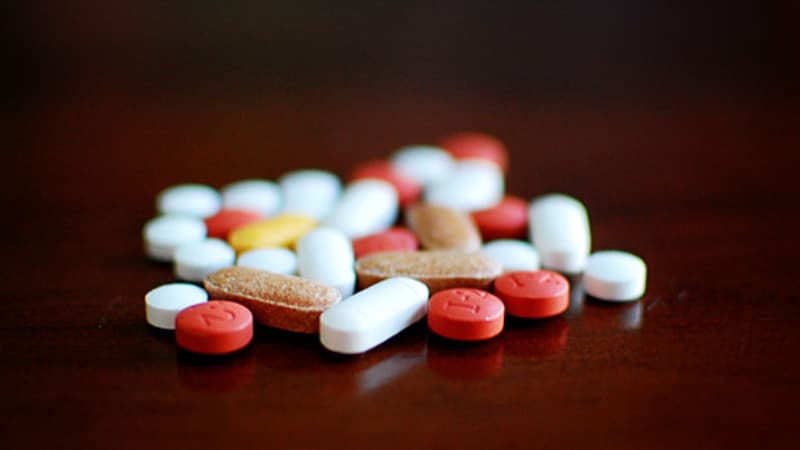“Spices work well when mixed, drugs don’t.” The National Medicines Safety Agency (ANSM) launches this Wednesday an important information and prevention campaign to warn about the risks of self-medication.
Choice of treatment, quantity, duration, each patient requires personalized instructions to treat their ailments.
“Medications are prescribed for a particular pathology for the same person, I do not advise anyone to exchange medications or give them to their neighbor because they think they have the same symptoms,” warns Frédéric Desmoulins, a pharmacist at the BFMTV microphone.
However, many French people take the initiative to take medicine without a prescription.
According to a study carried out by the ANSM with a French panel, three out of ten patients adjust the dose or duration of the prescribed medication themselves, one in five take doses higher than those recommended or mix several medications at the same time and one in two French people they give medicine to their relatives who have the same symptoms as them.
“In practice, people are reasonable”
However, these practices involve risks, which can lead to the death of the user.
“If we add up all the misuse of medicines, there are 10,000 deaths a year, three times more than traffic accidents, and 130,000 hospitalizations,” warns Dr. Alain Ducardonnet, BFMTV health consultant, citing advanced figures from the Good Use of Drugs Collective. Medicines in 2018.
While acknowledging that there are “many” cases of self-medication, general practitioner Jean-Christophe Nogrette wishes to underline that he sees “very few accidents” in his practice with serious consequences.
“The theoretical risk is that people don’t have training so they don’t know what they’re doing (…), but in practice people are reasonable,” he told BFMTV.com, who is also the union’s deputy general secretary. of general practitioners MG France.
Know “the rules of the game”
Overdose is one of the most common risks of self-medication. “If I feel like I need it or it’s not strong enough, I’ll increase the dose myself,” a young woman said into our microphone.
If it is a drug that contains paracetamol, such as Doliprane or Efferalgan, this practice does not present any risk, as long as “the rules of the game are well known”, warns Alain Ducardonnet, that is, do not exceed one gram of medication per dose, spaced themselves out from four to six hours, for a maximum of three grams per day.
Beyond that, there is a risk of drug-induced hepatitis, which may even require a liver transplant. The same story by Jean-Christophe Nogrette, who explains that an overdose of anti-inflammatories can be risky for the good health of the kidneys or that an excessive intake of beta-blockers can cause cardiac arrest.
Beware of overdoses of food supplements
The doctor also sees an overdose of food supplements going through his consultation.
“We are also seeing more and more overdoses of food supplements, especially from mothers who give their babies vitamin D, because it is fashionable,” she says.
However, this type of overdose “can be dangerous and lead to neurological disorders,” adds the doctor, specifying that these extreme cases are still rare.
Likewise, the initiative to take a drug may not be dangerous, but “if we add to the equation a treatment that the patient is undergoing in parallel for one chronic disease or another, that can complicate things”, emphasizes Jean-Christophe Nogrette.
What happens with expired medications?
The ANSM also invites users to pay attention to the methods and shelf life of the drugs.
For Jean-Christophe Nogrette, the most common risk of consuming an expired medicine is “a small loss of efficacy”. It can also become toxic, but this only happens if it is kept in very poor conditions. The stability of the products is still a very appreciated element at the time of their development.
“Antibiotics should not be taken if they are expired, because the effectiveness is not good and they can be toxic. Eye drops, syrups, ointments are the same, especially if they are open, we throw them away. for small sores, we can tolerate four to five months of expiration”, specifies doctor Alain Ducardonnet.
Beyond these risks, doctors are not necessarily opposed to self-medication for common symptoms patients regularly experience, such as migraines or colds.
“People are competent to treat them themselves, but if it gets worse, we don’t persist and make an appointment,” advises Jean-Christophe Nogrette.
A consequence of the lack of doctors.
Self-medication is also often a consequence of the lack of general practitioners.
“When I don’t necessarily have a chance to see the doctor again, I take the initiative to take additional medication,” says a young woman.
In this case, the assistant general secretary of the union of general practitioners advises contacting pharmacists, who also have good advice waiting for an appointment with your doctor.
In any case, in general practice, the “‘what have you taken yet?’ it has become a matter of ritual”, says Jean-Christophe Nogrette.
Source: BFM TV


